- Home
- Suzanne Selfors
Smells Like Treasure Page 6
Smells Like Treasure Read online
Page 6
Homer wondered why his uncle had never mentioned Mr. Tuffletop. But then again, his uncle had had so many secrets.
“Go on. I’ve got a lot of work to do. You know the way out.”
“Thank you, Victor,” Zelda said.
“Thank you, Mr. Tuffletop,” Homer said. After putting on his shoes, he and Dog followed Zelda to a doorway.
“Why didn’t we use this door instead of falling through the ceiling?” Homer asked as they emerged into a little alley that ran behind the department store.
“Exit only,” Zelda said pointing to the door. Sure enough, that’s what it said: EXIT ONLY.
Just under the two-hour mark, Zelda landed the cloudcopter in the Puddings’ lower pasture. She turned off the engine and, as the cloud cover dissipated, the little farm came into view. “The truck’s not here,” Homer said as he pulled off his goggles. “That means they’re still at the fair.”
“Good.” Zelda handed Homer two train tickets. “These are round-trip tickets from Milkydale to Gloomy Moor for you and Dog. I will meet you at the Gloomy Moor station.”
Homer read the date. “But these are for tomorrow.”
Zelda reached into her purse and handed Homer an envelope. “Here is a letter that I’ve written to your parents inviting you to spend the week with me. You will need to persuade them to accept this invitation. It would be a shame if we missed the membership meeting.”
“How will I persuade them?”
“The county fair runs for the entire week. Is that so?”
“Yes,” Homer said.
“Then use that as your excuse. You need something to do while your family’s at the fair. It was very resourceful of you to get yourself banned.”
“I didn’t do it on purpose,” Homer said, and even if he had, he wasn’t sure being banned would help. Mr. Pudding detested any mention of treasure hunting. He’d long resented his brother’s abandonment of the goat farm for the glory of treasure, leaving him behind to take care of the place. Asking to stay with one of Uncle Drake’s friends would not go over well. “What if they won’t let me?” Homer asked.
“It wouldn’t be the end of the world,” Zelda said with a deep sigh. “But in order for a new member to claim an empty chair, a majority of the membership must be in attendance. That will happen this week. It is rare to have a majority, what with everyone usually scattered to all corners of the world. It could be years before a majority is able to meet again.”
“Years?” Homer cried.
Dog stood on Homer’s lap. Some of the goats had wandered up to the ’copter. One of them stuck her head into the cockpit and nibbled on Homer’s shoelace. “Urrrr,” Dog said, wagging his tail.
Zelda sighed. “If you miss this membership meeting, well, then you must wait for the next meeting.”
“Which could be years away?”
Zelda nodded.
“I won’t miss it,” Homer said, pulling his pant leg out of another goat’s mouth. “I’ll be there. I’ll figure out a way.”
10
Sticks and Stones
On Sunday morning, the day after the gunnysack slide’s collapse, the Milkydale newspaper editor printed this headline:
PUDDING BOY AND HIS DOG TRY TO DESTROY FAIR
And printed this article:
Opening day at the county fair, usually a joyous occasion, was marred by the unfettered delinquency of local boy Homer Pudding and his dog.
Numerous witnesses report that Homer Pudding and his dog ran amuck with complete disregard for public and personal property. While no one was seriously hurt, a number of rabbits have yet to be found and the dog agility trials had to be postponed. Pies, ice cream, and lemonade were among the items destroyed. And there is the matter of the gunnysack slide, which will need to be rebuilt.
“Pudding should pay for the slide,” Mr. Crescent said. Mr. Crescent, who lives next door to the Puddings, is familiar with Homer’s shenanigans. “He digs holes in my yard. And that stupid dog of his is completely useless.”
After surveying the damage, Mayor Sneed wisely banned Homer Pudding and his dog from attending the fair for the duration of the week. This editor applauds Mayor Sneed for taking such a strong stand against juvenile delinquency. And against dogs that don’t behave.
Homer had read the article, as had everyone in the Pudding family, except for Squeak, who couldn’t read. This was not the first time Homer had made his way into the local newspaper. At the age of one he crawled into the middle of the parade route and caused a huge pileup. Parade Ruined by Pudding Boy. At the age of three he fell into Frog Egg Pond and nearly drowned. Pudding Boy Swallows Pollywogs and Lives. At the age of seven he left the lower pasture’s gate open and the goats got out and ate all the flowers in Veterans’ Memorial Park. Pudding Boy’s Goats Are Unpatriotic. At the age of ten he dug a hole so deep that it freed an underground spring, which flooded the town. Pudding Boy Is a Nuisance! And then there was the recent library incident. Pudding Boy and His Dog Burn Down the Library.
Though each article had brought shame to the family, Mrs. Pudding kept copies tucked in the back sleeve of the family photo album. She believed with all her heart that one day, when her son had found his way in the world, they’d look back at those articles and laugh. But on that morning, no laughter filled the Pudding kitchen.
Mr. Pudding tossed the newspaper aside, then smacked his callused hand on the table. “Crescent’s dogs were running with the pack, just like the rest of the dogs. How come the editor didn’t mention that?”
A plate of steaming pancakes appeared before Homer. “Eat up,” Mrs. Pudding said, planting a kiss on his head.
“Thank you,” he said quietly. He didn’t feel much like eating, so he poked the top pancake with his fork again and again. Dog lay wedged between Homer’s feet, and, to Homer, his warm belly felt better than a pair of slippers.
Another plate was set before Squeak, who immediately drowned his pancakes in a sea of blueberry syrup. Homer hadn’t mentioned Zelda’s invitation. He was waiting for his father to head out to the barn. It would be best to show Zelda’s letter to Mrs. Pudding. Convincing her would be easier. But the timing had to be right.
“Juvenile delinquent,” Mr. Pudding grumbled, reaching for his mug of coffee. “He called my son a juvenile delinquent!”
“I could just die,” Gwendolyn said, her face blotchy with emotion. She folded her arms and slid low in her chair. “I could just die from the humiliation of it all.”
“Now, Gwendolyn,” Mrs. Pudding said, flipping more pancakes. “It’s not as bad as all that.”
But it was as bad as all that, and everyone at the table knew it.
“I’ll figure out how to pay,” Homer said, looking up from his hole-covered pancakes. “I paid for the new library by selling my original Galileo Compass. I’m sure I can find a way to pay for the gunnysack slide.”
“Maybe Homer can find some treasure,” Squeak said.
Mr. Pudding scowled. Then something banged against the front door so loudly that Mrs. Pudding dropped her spatula. Out in the yard the farm dogs started barking, as did Dog, who nearly knocked over Gwendolyn’s chair as he ran out from under the table.
“What in the name of sweet buttermilk is going on?” Mr. Pudding grumbled.
Squeak jumped off the bench, ran to the door, and pulled it open. “It’s a rock,” he announced. “It’s got something on it.”
“Hand it over,” Mr. Pudding said. Squeak handed the rock to his father, who unwound a large rubber band and opened the note that had been attached. His face flushed red. Dropping the note onto the table, he rushed to the front door. “Who did this?’ he called.
Gwendolyn’s hand shot out and she grabbed the note. “It says, Stay home, Homer. And your stupid dog, too. Or you’ll both get what’s coming to you.” She smoothed out the paper. “There’s a drawing.”
Homer leaned across the table for a better look. The anonymous artist had barely mastered the rudimentary skills of figure drawing
. In the pencil sketch Homer’s body looked like a pumpkin with two stick legs. And Dog’s looked like a pumpkin with four stick legs. Both figures had crossed eyes and buckteeth and the word Loser scrawled across their foreheads.
“Who would do this?” Mrs. Pudding cried. “Who would do such a terrible thing?”
Under normal circumstances, Homer would have been insulted by the drawing. While he’d been called a loser many times before, it sure didn’t seem fair that they were picking on Dog. But on that morning, the note seemed more like a gift than a threat because its timing couldn’t have been better. The worried look on Mrs. Pudding’s face told Homer that success was possible.
Mr. Pudding slammed the front door. “Kids,” he muttered. “They must have been on bikes.” Then he grabbed his coat from its peg. “Finish your breakfast. We’ve got chores to do before the fair starts.”
Mrs. Pudding pulled her husband aside and whispered. “Dear? What if they come back? Homer can’t stay home alone all week while we’re at the fair. It’s too dangerous.”
“We can’t stay home and babysit him,” Mr. Pudding said.
“Mom. Dad.” Homer walked over to his parents and held out Zelda’s letter. “This came in the mail yesterday. I opened it by accident.”
Mr. Pudding read the letter, a short note in which Zelda introduced herself and asked if Homer and Dog could spend the week with her. “Says here she was my brother’s friend,” Mr. Pudding said with a frown. “You know what that means. It means she’s one of those treasure hunters.”
“She’s very nice,” Homer said. “She’s the one who found the buyer for my Galileo Compass, Dad, remember? She’s the reason I got all that money to pay for the new library.”
Mr. Pudding read the letter again. “You think I’m going to let you stay with a person I don’t even know?”
“But, dear…” Mrs. Pudding pulled her husband aside again. “You know how kids can be. Homer doesn’t know how to protect himself. And you certainly don’t want to miss the dog trials.”
Mr. Pudding rubbed the back of his neck.
“Homer says she’s very nice,” Mrs. Pudding pointed out. “And any friend of Drake’s is a friend of ours. I think it would be best to get Homer out of town until the fair’s over. Everyone is feeling so… hostile.”
“But that’s an entire week,” Mr. Pudding said.
“Yes, dear, but it will pass quickly.”
As Dog licked syrup from Squeak’s hand, Homer tapped his bare feet, waiting for his father to decide.
“Fine,” Mr. Pudding mumbled.
“I don’t believe it,” Gwendolyn said, throwing her napkin onto the table. “Homer destroys the fair and what’s his punishment? You send him on vacation.”
Homer threw his arms around his mother. He felt bad about lying to his parents, especially his mother, who’d never once told him to give up his treasure-hunting dreams. He wished he could tell her everything.
Once morning chores were finished, Homer packed his backpack. Mrs. Pudding made sure he had warm clothes, a toothbrush, plenty of underwear, and a box of Band-Aids, just in case. After she left the room, Homer unzipped his backpack and added his Swiss army knife, his Extra Strong Borington Binoculars, a water bottle, his night vision headlamp, and his copy of The Biography of Rumpold Smeller. He also added some mapmaking gear, such as mechanical pencils, a ruler, a pad of paper, a compass, and a protractor. The fake Galileo Compass was already around his neck, so there was nothing more to pack. He broke into a huge grin.
He was about to claim membership in the secret Society of L.O.S.T.!
Never mind the bad fortune from the fortune-teller. Never mind that one of the L.O.S.T. members didn’t want him to join. Homer W. Pudding was about to claim his destiny, and nothing was going to stop him.
“Okay, Dog. Let’s go.”
PART TWO
GLOOMY MOOR
11
The Writer’s Warning
The express train did not run on Sunday. The local train to Gloomy Moor took four hours, stopping at fourteen villages along the way, including Swineville, Pottyshire, and Lumpwood. Homer had settled into a window seat. Mrs. Pudding had packed a delicious farm lunch. Having eaten two ham and goat cheese sandwiches, Dog lay draped across the seat next to Homer, snoring.
Homer propped his book on his knees. He’d read through the first two chapters of The Biography of Rumpold Smeller, which covered Rumpold’s childhood. One of the reasons Rumpold grew to be such a ferocious pirate, the author theorized, was because he’d been so fond of fighting when he was a boy. He’d loved weaponry of all kinds—the sword in particular, which had made his father exceedingly proud. But the real reason Rumpold was destined to become a pirate, according to the author, was because he despised authority. Rules were made to be broken. Laws were for everyone but him. No one could tell him what to do.
Homer had read all this before. It was well known that Rumpold had been a devilish little boy. It made perfect sense that the meanest pirate in the world had been a horrid child. But during this reading, Homer paid extra attention. He had no idea what questions the membership would ask, so he needed to know as much as possible. He’d make Uncle Drake proud by answering all the questions correctly and by claiming the empty chair.
He’d just turned the page to begin chapter 3 when someone cleared her throat. “Is this seat taken?” A woman in doughnut-size sunglasses and an orange scarf stood in the aisle. She pointed at the window seat that faced Homer’s window seat.
“No one’s sitting there,” Homer said.
She squeezed past Homer’s knees, then sat. Her raincoat was buttoned up to her chin and she wore a pair of orange gloves. Her scarf was pulled snugly around her face and knotted at her chin, and her sunglasses were so big that all Homer could see of her face was her mouth and two slivers of cheek. She opened a briefcase and pulled out a notebook and pen. “My name is Ms. Pore, Ph.D. I’m a writer,” she said. “I’m working on a very important book.”
Dog snorted as he shifted position. Homer leaned forward. “What kind of book?”
“I’m calling it The Encyclopedia of Professions. I am in the process of rating all known professions.” Ms. Pore pointed her pen at Homer. “What is your profession? Tell me and I’ll tell you how it rates.”
Homer closed his book. “I’m twelve,” he said. “I don’t have a profession.”
“Yes, of course. But what is your desired profession?”
“My dad wants me to be a goat farmer.”
She opened her notebook and flipped through the pages. “Here it is. It says here that goat farming rates very high on the happiness index. Goat farmers are some of the happiest people in the world, even happier than candy makers and puppy wranglers.” She smiled. “Your father is very wise to choose that profession for you.”
Homer chewed on his lip. “What profession is lowest on the happiness index?” As Ms. Pore flipped through the pages again, a shivery feeling washed over Homer. Was this how Excelsior felt when he was about to predict the future? Because Homer knew, even before Ms. Pore opened her mouth, what her answer would be.
“Treasure hunter,” she said. “Treasure hunter is the lowest profession on the happiness index, even lower than Porta Potti cleaner, poison tester, and skunk trainer. Even lower than the person who gets shot out of a cannon at the circus.” She turned the page. “However, treasure hunters rank highest on the misery scale. And they rank highest on the social rejection scale. And they rank highest on the likelihood of getting killed on the job scale.” She closed her notebook. “You’d have to be a real dummy to want to be a treasure hunter. You don’t want to be a treasure hunter, do you?”
“No,” Homer murmured as he scratched Dog’s ear. “Not me.”
“Good,” Ms. Pore said. “I’ve been doing this research for many years now, and believe me, the happiest, healthiest, and longest-living people I’ve met have been goat farmers.” The train slowed. She stuffed her notebook and pen back into her bri
efcase. “It’s something to consider, young man. A happy, healthy, long life is much better than a short one drenched in misery, failure, and social rejection. Well, here’s my stop. Lumpwood.” And off she went.
Dog burped a bit of ham and goat cheese sandwich, then slid off the seat and stretched across the floor. Homer stared out the window as Ms. Pore, Ph.D., hurried off the train and into the station. Two warnings about becoming a treasure hunter in two days. And not from family but from two strangers.
Homer opened his hand. The forked life line ran across the palm, the shorter path ending at the base of his thumb where the treasure hunter line sat. The longer path reached toward his index finger. They were lines like any other lines. Nothing more. Just lines on a hand.
Right?
12
To Zelda’s Trinket Shop
Steam swirled around Homer and Dog as they stepped off the train. “You sure you want to get off here?” the conductor asked.
“This is Gloomy Moor, right?” Homer asked.
The conductor took off his black hat and scratched above his ear. “That’s right. Gloomy Moor. But there’s nothing around here, kid. You sure you know what you’re doing?”
“I’m meeting my friend,” Homer said, holding tight to Dog’s leash.
“Okeydokey, kid. Just don’t get stuck out here after nightfall. There’s some nasty wildlife out on the moor.” He set his hat back onto his head.
For the last half hour of the train ride, the terrain had been flat and seemingly lifeless. “What do you mean?” Homer asked. “What kind of nasty wildlife?”
The conductor blew his whistle and stepped onto the train. “Good luck.” The train lurched a few times, then pulled away from the station, the chugga-chugga sound picking up its tempo.
Bears? Wolves? How nasty?

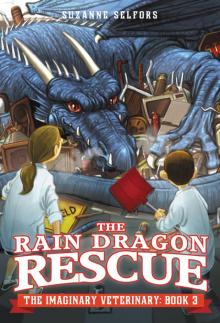 The Rain Dragon Rescue
The Rain Dragon Rescue Ginger Breadhouse and the Candy Fish Wish
Ginger Breadhouse and the Candy Fish Wish Ever After High: Lizzie Hearts and the Hedgehog’s Hexcellent Adventure: A Little Shuffle Story
Ever After High: Lizzie Hearts and the Hedgehog’s Hexcellent Adventure: A Little Shuffle Story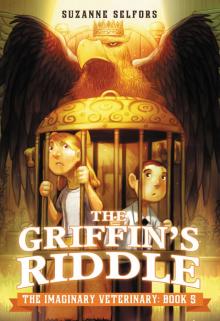 The Griffin's Riddle
The Griffin's Riddle Smells Like Pirates
Smells Like Pirates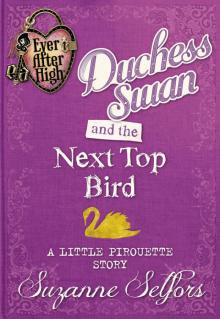 Duchess Swan and the Next Top Bird
Duchess Swan and the Next Top Bird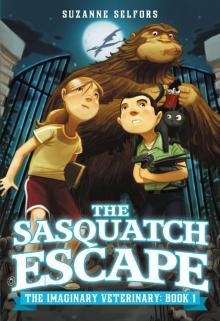 The Sasquatch Escape
The Sasquatch Escape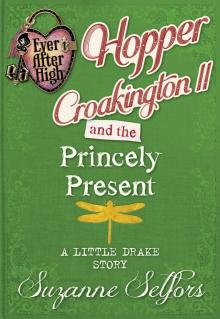 Hopper Croakington II and the Princely Present
Hopper Croakington II and the Princely Present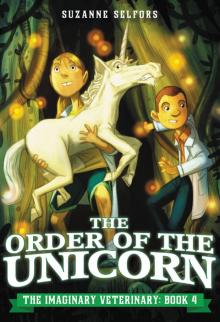 The Order of the Unicorn
The Order of the Unicorn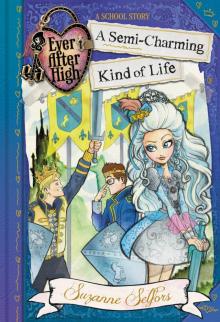 A Semi-Charming Kind of Life
A Semi-Charming Kind of Life Braver
Braver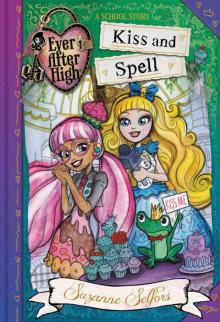 Kiss and Spell
Kiss and Spell Wedgie & Gizmo
Wedgie & Gizmo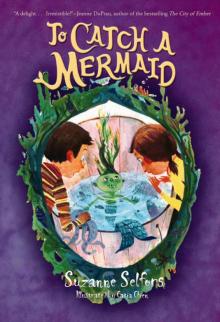 To Catch a Mermaid
To Catch a Mermaid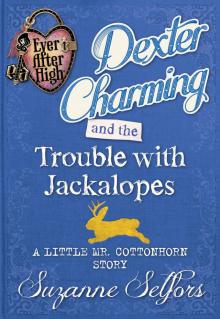 Dexter Charming and the Trouble with Jackalopes
Dexter Charming and the Trouble with Jackalopes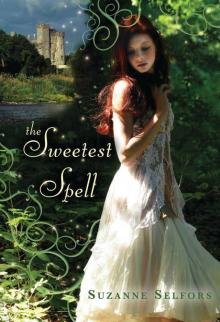 The Sweetest Spell
The Sweetest Spell CoffeeHouse Angel
CoffeeHouse Angel Wish Upon a Sleepover
Wish Upon a Sleepover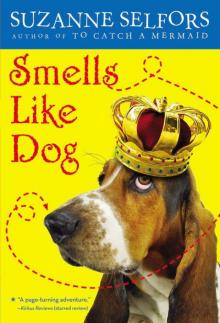 Smells Like Dog
Smells Like Dog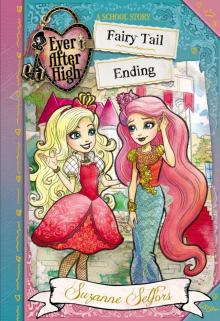 Ever After High
Ever After High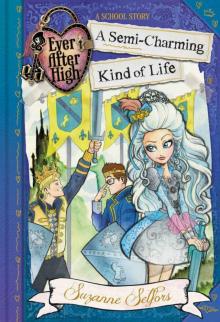 Ever After High: A Semi-Charming Kind of Life
Ever After High: A Semi-Charming Kind of Life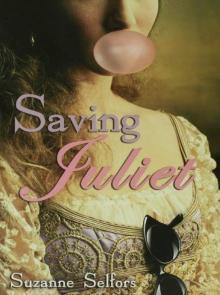 Saving Juliet
Saving Juliet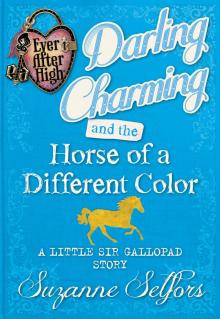 Darling Charming and the Horse of a Different Color
Darling Charming and the Horse of a Different Color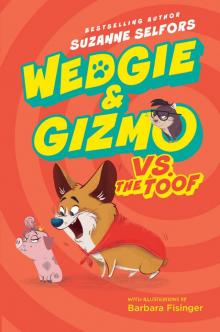 Wedgie & Gizmo vs. the Toof
Wedgie & Gizmo vs. the Toof Spirit Riding Free--The Adventure Begins
Spirit Riding Free--The Adventure Begins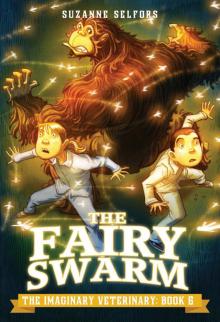 The Fairy Swarm
The Fairy Swarm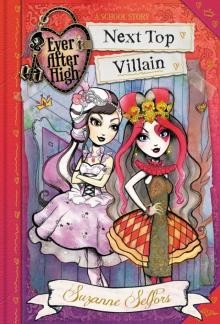 Ever After High: Next Top Villain: A School Story
Ever After High: Next Top Villain: A School Story Fortune's Magic Farm
Fortune's Magic Farm The Lonely Lake Monster
The Lonely Lake Monster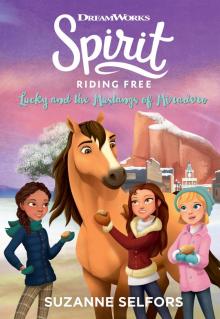 Spirit Riding Free--Lucky and the Mustangs of Miradero
Spirit Riding Free--Lucky and the Mustangs of Miradero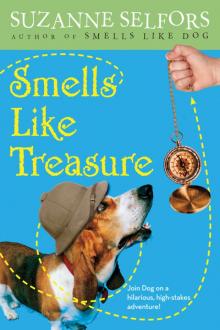 Smells Like Treasure
Smells Like Treasure Mad Love
Mad Love